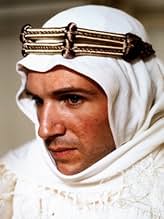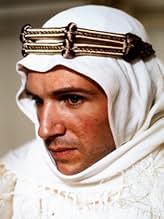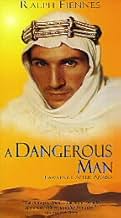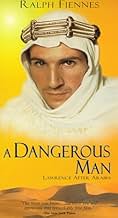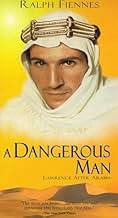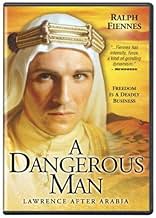Lawrence and Feisal go to argue for Arab independence at the 1919 Paris Peace Conference.Lawrence and Feisal go to argue for Arab independence at the 1919 Paris Peace Conference.Lawrence and Feisal go to argue for Arab independence at the 1919 Paris Peace Conference.
Alexander Siddig
- Feisal
- (as Siddig El Fadil)
- Director
- Writer
- All cast & crew
- Production, box office & more at IMDbPro
Featured reviews
Interesting, but also uninteresting.
The key plotlines of 'A Dangerous Man: Lawrence After Arabia', an "unofficial sequel" to that 1962 movie, are actually fairly intriguing, though it's all kinda presented via quite underwhelming means. My personal interest in events onscreen dipped and piqued fairly often. A trimmed run time would've helped, I'd imagine.
On the cast, a debuting Ralph Fiennes makes for a solid Lawrence, though that is not a surprise given he is an excellent actor. Alexander Siddig (aka Siddig El Fadil, also basically debuting) is another noteworthy name, though I feel like he would've made a better Sherif Ali (not that he appears here) rather than Prince Faisal - Siddig is good, all the same.
The key plotlines of 'A Dangerous Man: Lawrence After Arabia', an "unofficial sequel" to that 1962 movie, are actually fairly intriguing, though it's all kinda presented via quite underwhelming means. My personal interest in events onscreen dipped and piqued fairly often. A trimmed run time would've helped, I'd imagine.
On the cast, a debuting Ralph Fiennes makes for a solid Lawrence, though that is not a surprise given he is an excellent actor. Alexander Siddig (aka Siddig El Fadil, also basically debuting) is another noteworthy name, though I feel like he would've made a better Sherif Ali (not that he appears here) rather than Prince Faisal - Siddig is good, all the same.
Ralph Fiennes makes a very convincing impersonation of the enigmatical T.E.Lawrence with all the complications of his case, especially concerning his integrity and political departure from the public scene, Ever since he made his career that brought him world fame and interest, it has been wondered who he really was, he became an enigma from the start, and that enigma has never been solved, while the main result of this film is to add to the enigma. Alexander Siddig makes as memorable a figure of Prince Feisal as Omar Sharif did of Sherif Auda, while the characters of Curzon, Clemenceau, Churchill, Wilson and the others enrich the film with political interest. The main story of the film is the account of how everything went wrong in the peace conference of Paris as Lawrence and the Arabs got practically nothing as a result of their efforts but mainly only were driven over and Lawrence even practically driven into exile, at least forced into disappearing anonymity, The film is therefore most like a documentary and extremely interesting as such, since it is impartial, tells the truth and is meticulous about it. Nothing can vie with or excel the splendour of David Lean's great epic, but one almost feels inclined to regard Ralph Fiennes' characterisation of Lawrence as more real and convincing than Peter O'Toole's.
If you're like me, the film LAWRENCE OF ARABIA always leaves you hungering for more viewing material about T.E. Lawrence. Since documentaries sadly don't seem to appeal to all tastes this outstanding telefilm may satisfy your apetite. The movie deals with Lawrence's activities at the Paris Peace Conference following World War One and the cast is wonderful. Appropriate for material based on real events the film avoids hype and melodrama, keeping the viewer riveted with it's mature, intelligent approach. No matter what your politics it's intriguing to watch this movie and reflect on "what might have been" regarding relations between the Western Democracies and the nations being formed from the remains of the Ottoman Empire. The closing scene between Lawrence and Feisal nicely summarizes the sense of a monumental lost opportunity.
Program this film as a second feature the next time you watch LAWRENCE OF ARABIA for a wonderful marathon viewing experience.
Program this film as a second feature the next time you watch LAWRENCE OF ARABIA for a wonderful marathon viewing experience.
Call me an elitist if you like, but this film is not for the general public; it is for the erudite, educated and well-informed only. All others will be hopelessly lost in an ocean of Western and Eastern stereotypes and suppositions. I enjoyed this triumphant tragedy more than most; of that I have no doubt. I have my own copy of "The Seven Pillars of Wisdom", the masterpiece of T. E. Lawrence's life's work. I found the age differential between the original film masterpiece character of Prince Feisal (played by a middle-aged Alec Guinness) and the young Prince Feisal of this film to be slightly disconcerting, but something that, ultimately, the viewer can overlook. Ralph Fiennes is, of course, superb; as is all of the supporting cast. I did not care much for the ending, which I will not reveal, but that too did not affect the overall tenor of the film. If you enjoyed the prequel, you will most likely enjoy the sequel; despite the absence of special effects, a cast of thousands, and an epic budget. This is a thinking man's film, and not one to be enjoyed by someone looking for eye candy. Anyone who does not appreciate the content of this film would be, in my opinion, be ignorant and ill-informed. So to all those romantics out there who love T. E. Lawrence; enjoy every minute.
The great Lawrence of Arabia fights side-by-side with the Arabs to help save Arabia from Turkish invaders. Fade to black. Roll credits. End of story.
Well, not entirely. A Dangerous Man: Lawrence After Arabia, tells more. In this movie, T.E. Lawrence (Ralph Fiennes) goes to Paris with Feisal (Alexander Siddig) to argue for Arab independent rule during the 1919 Paris Peace Conference. In Paris, instead of the shifting sands of the desert, Feisal and Lawrence encounter shifting political alliances.
If you're interested in current Middle East affairs, this movie provides some insight. It portrays the division of the Middle East into "spheres of influence." England, France, and the United States would each be responsible for a particular sphere. Feisal and Lawrence want Great Britian to make good on their wartime promise to create Syria as an independent Arab state. However, Britian now supports France as the eventual ruler of Syria.
A brief scene shows Lawrence watching a worker oiling a chandelier. Lawrence explains to his companion, "If France gets Syria, we [the British] get the Persian Gulf." His companion replies that if Britian must choose between loyalty to Feisal or access to petroleum... well, Feisal doesn't stand a chance.
Through Feisal, we get some sense of how the Arabs must have felt as their homeland was carved into pieces of pie for the powerful, oil-hungry Western world. It's interesting that, through most of the movie, Feisal speaks to other officials only through Lawrence although Feisal speaks fluent English. In fact, Feisal relies on Lawrence to not only interpret but, in some cases, to create his thoughts. While this may or may not be historically accurate, it certainly highlights Feisal's precarious position.
The movie briefly questions Lawrence's motives in helping Feisal. (`I want Syria to be our first brown dominion,' says Lawrence, `and I can do it with my Arabs.') Ultimately, though, it portrays him as a well-intentioned man caught up in politics that are out of his control. Syria did, in fact, go to France. In the 1920s, however, Britian supported Feisal as ruler of a new Arab kingdom - Iraq.
Terrifically acted by Ralph Fiennes and Alexander Siddig, this movie wraps up the loose ends of the Lawrence of Arabia legend. By the time the credits roll, you know much more about who, how, and why than you did before.
Well, not entirely. A Dangerous Man: Lawrence After Arabia, tells more. In this movie, T.E. Lawrence (Ralph Fiennes) goes to Paris with Feisal (Alexander Siddig) to argue for Arab independent rule during the 1919 Paris Peace Conference. In Paris, instead of the shifting sands of the desert, Feisal and Lawrence encounter shifting political alliances.
If you're interested in current Middle East affairs, this movie provides some insight. It portrays the division of the Middle East into "spheres of influence." England, France, and the United States would each be responsible for a particular sphere. Feisal and Lawrence want Great Britian to make good on their wartime promise to create Syria as an independent Arab state. However, Britian now supports France as the eventual ruler of Syria.
A brief scene shows Lawrence watching a worker oiling a chandelier. Lawrence explains to his companion, "If France gets Syria, we [the British] get the Persian Gulf." His companion replies that if Britian must choose between loyalty to Feisal or access to petroleum... well, Feisal doesn't stand a chance.
Through Feisal, we get some sense of how the Arabs must have felt as their homeland was carved into pieces of pie for the powerful, oil-hungry Western world. It's interesting that, through most of the movie, Feisal speaks to other officials only through Lawrence although Feisal speaks fluent English. In fact, Feisal relies on Lawrence to not only interpret but, in some cases, to create his thoughts. While this may or may not be historically accurate, it certainly highlights Feisal's precarious position.
The movie briefly questions Lawrence's motives in helping Feisal. (`I want Syria to be our first brown dominion,' says Lawrence, `and I can do it with my Arabs.') Ultimately, though, it portrays him as a well-intentioned man caught up in politics that are out of his control. Syria did, in fact, go to France. In the 1920s, however, Britian supported Feisal as ruler of a new Arab kingdom - Iraq.
Terrifically acted by Ralph Fiennes and Alexander Siddig, this movie wraps up the loose ends of the Lawrence of Arabia legend. By the time the credits roll, you know much more about who, how, and why than you did before.
Did you know
- TriviaJoseph Fiennes, in his uncredited debut, plays brother Ralph Fiennes' character Lawrence's younger brother. He had to sneak out of school during a lunch break to play the bit-part.
- Quotes
T. E. Lawrence: All men dream; but not equally. Those who dream by night in the dusty recesses of their minds Awake to find that it was vanity; But the dreamers of day are dangerous men. That they may act their dreams with open eyes to make it possible.
- ConnectionsEdited into Great Performances: A Dangerous Man: Lawrence After Arabia (1992)
Details
- Release date
- Country of origin
- Language
- Also known as
- A Dangerous Man
- Production companies
- See more company credits at IMDbPro
Contribute to this page
Suggest an edit or add missing content

